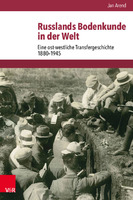Russlands Bodenkunde in der Welt
Eine ost-westliche Transfergeschichte 1880–1945
Author(s)
Arend, Jan
Collection
Knowledge Unlatched (KU)Number
104885Language
GermanAbstract
Im Sommer 1914 schickte der russische Agrarwissenschaftler und Bodenkundler Konstantin Glinka ein Manuskript nach Berlin. Es enthielt die erste an eine ausländische Leserschaft gerichtete Darstellung der russischen Bodenkunde, einer frühökologischen Lehre vom Boden, die auf der Erforschung der Schwarzerde fußte. Dies war der Beginn einer Erfolgsgeschichte: Die russische Bodenkunde reüssierte in der Zwischenkriegszeit in Europa und den USA. Nach 1945 wurde sie zu einem Klassiker der modernen Agrar- und Umweltwissenschaften.Jan Arend erzählt die Geschichte eines Wissenstransfers von Ost nach West. Er folgt Wissenschaftlern, Manuskripten und Begriffen – von den Schwarzerde-Provinzen des Russischen Reichs über die Podien internationaler Konferenzen bis in die Kabinette von amerikanischen Agrarplanern und Bodenschätzern in NS-Deutschland. Das Buch führt dabei in anschaulicher Weise vor Augen, wie sich Wissen in Form und Inhalt transformiert, wenn es übersetzt, vermittelt und in neue politis
Keywords
History; Osteuropäische Geschichte; 19./20. Jahrhundert; Transnationale Geschichte; Russland; Ehemalige SowjetunionDOI
10.13109/9783666301124ISBN
9783666301124OCN
1135849411Publisher
BrillPublisher website
https://brill.com/Publication date and place
2019Imprint
Vandenhoeck & RuprechtClassification
European history


 Download
Download Web Shop
Web Shop